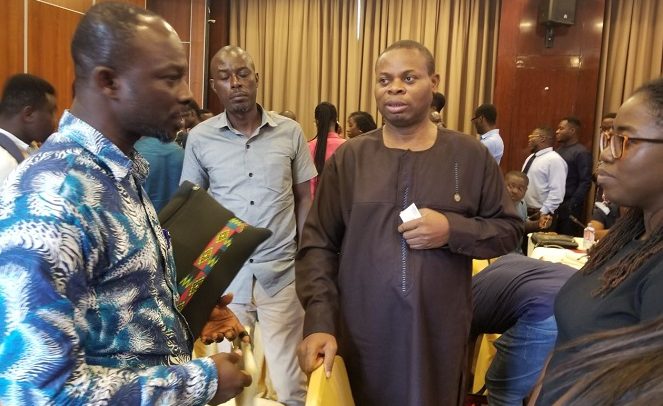Franklin Cudjoe ( CEO, IMANI Ghana) in conversations with stakeholders after the climate change forum
The government is expected to raise US$ 6.3 billion (about GH¢82 billion) by 2030 from the domestic financial market to implement its Nationally Determined Contributions (NDCs) on climate change.
The funds will be used to support the implementation of the revised 34 mitigation and adaptation mechanisms submitted to the United Nations Framework Convention on Climate Change (UNFCCC).
The government also intends to raise US$ 3.7 billion and US$ 1.7 billion from the commercial market and corporate social responsibility. It will commit US$ 1.4 billion of the national budget to domestic financing needs.
This was disclosed at a stakeholders engagement on the “Prospects of Climate Finance in Ghana Under the Current Fiscal Crisis”.
Vice Dean, Office of Research, Innovation and Consultancy, University of Mines and Technology, Dr. Frank Boateng said apart from the oil and gas investment of US$ 14.2 billion, climate financing inflows to Ghana from 2011 to 2019 were US$ 1.3 billion. Grants and loans constituted about 91.1 percent of the total climate finance inflows over the period.
“The private sector and private foundations contributed 1.43 percent, indicating a low domestic contribution to climate financing inflows. He pointed out that escalating public debt, low government revenue mobilization, and changing donor priorities have rendered national budget support, grants, and loans the least reliable alternatives in the long run” he stated.
Dr. Boateng recalled that in 2019, the government established the SDG Delivery and Green Funds to raise capital to support the NDCs implementation.
The government expects the private sector to contribute about US$ 100 million to the SDG Delivery Fund and US$ 200 million to the Green Fund. This will complement state-side efforts to address the financing gap.
“Apart from the threats of the climate crisis (drought, food insecurity, and energy insecurity), Ghana can potentially miss SDG 7 (Affordable and Clean Energy) and SDG 12 (Climate Action) if the country fails to raise the requisite investment from now to 2030” he added.
By Prince Fiifi Yorke

